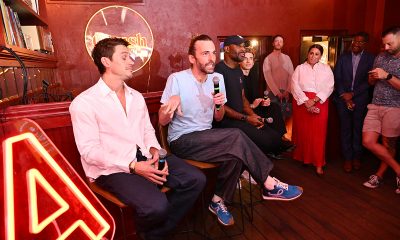District of Columbia
Local officials weighing impact of Trump’s D.C. executive order
‘Safe and Beautiful Task Force’ slammed as ‘blatant federal overreach’
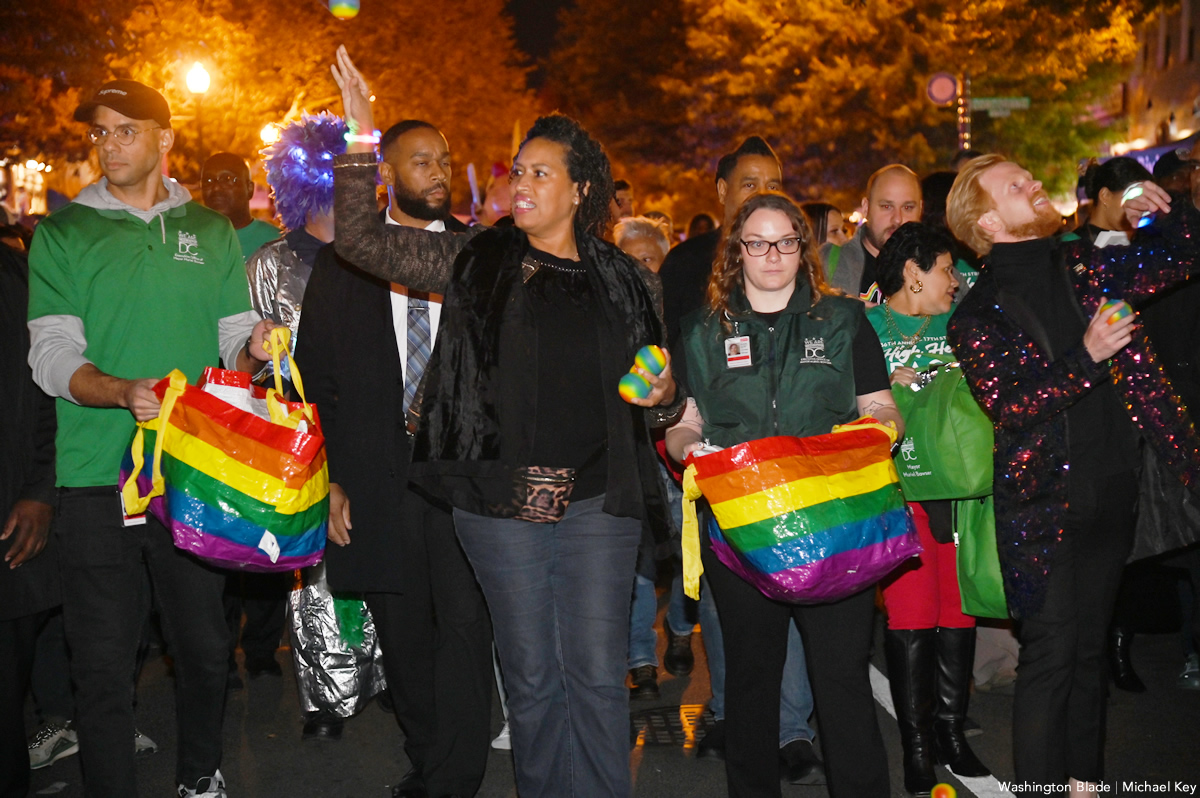
D.C. government officials and local LGBTQ rights advocates have expressed differing views on the potential impact of an executive order issued by President Donald Trump on March 27 that creates a federally controlled D.C. Safe and Beautiful Task Force.
A statement released by the White House says the task force, among other things, will be directed to, “Surge law enforcement officers in public areas and strictly enforce quality-of-life laws in public areas like drug use, unpermitted demonstrations, vandalism, and public intoxication.”
The White House statement adds that the task force will also, “Maximize immigration enforcement to apprehend and deport dangerous illegal aliens, including monitoring D.C.’s cooperation with federal immigration authorities.”
According to the five-page executive order, the newly created D.C. task force will take on a wide range of other functions, including overseeing and coordinating “more robust local law enforcement presence” throughout the city, including in federal parks such as the National Mall, museums and national monuments, Union Station, and widely used public roads and highways such as Rock Creek Parkway.
One of its provisions calls for government entities to provide “assistance to increase the speed and lower the cost of processing concealed carry license requests in the District of Columbia.” The provision refers to D.C.’s process for licensing the right to carry a concealed handgun.
D.C. Congressional Del. Eleanor Holmes Norton (D-D.C.) is among the city’s elected officials who have denounced the D.C. Safe and Beautiful Task Force as a serious infringement on the city’s locally elected home rule government.
“President Trump’s thoroughly anti-home rule EO is insulting to the 700,000 D.C. residents who live in close proximity to a federal government, which continues to deny them the same rights afforded other Americans,” Norton said in a statement.
“The task force created by the EO would not include a single D.C. official to represent the interests of the people who reside within the District,” Norton said.
D.C. Mayor Muriel Bowser, who has been cautious in her response to the Trump administration’s controversial policies to downsize the federal government, has not yet taken a position on the Trump D.C. executive order, according to mayoral spokesperson Daniel Gleick.
D.C. City Council Chair Phil Mendelson (D-At-Large) is among the local officials and community advocates who have said it is too soon to make a definitive judgment on the Trump created task force’s impact on D.C. home rule. Mendelson pointed out at a March 31 news conference that a large part of the stated actions for the task force are aimed at overseeing federal parklands and other federally controlled areas such as national monuments.
“I don’t want to say that everything in there is innocuous,” Mendelson told reporters at the news conference. “But overall, a lot of it, if not most of it, is directives to the federal government to do things that are within the federal government’s purview, not as a let’s step on home rule,” Mendelson said.
But others, including Norton, said they believe the overall executive order and the task force it creates will result in a serious infringement on D.C. home rule and possibly the rights of D.C. residents.
Gay D.C. Council member Zachary Parker (D-Ward 5) issued a statement pointing out that over two decades D.C. has had a balanced local budget, achieved “historic decline in crime,” and had one of the nation’s “fastest improving urban school districts,” suggesting the Trump task force was not needed.
“Based on my reading of the executive order, I think it is impossible to determine if it will have any direct impact on the LGBTQ community in the District,” said longtime D.C. LGBTQ rights advocate Peter Rosenstein.
But Rosenstein added, “The EO is an offense to all the people of the District, as it disregards home rule. It will be crucial to see who is finally appointed to the panel and see what their plans are to implement it.”
He was referring to the fact that the order itself and the White House so far have not announced which federal officials will be appointed to serve on the task force. However, the White House statement names nine federal agencies whose leaders or designees will be among the task force’s members. Among the agencies named are the Departments of Interior, Transportation, and Homeland Security, along with the FBI and the U.S. Marshals Service.
The leaders of D.C.’s local LGBTQ Democratic Party and local LGBTQ Republican Party organizations – Capital Stonewall Democrats and Log Cabin Republicans of D.C. – had sharply differing views on the impact of the executive order and task force on the LGBTQ community.
The Washington Blade reached out to the two leaders for comment.
“This executive order is not about D.C. ‘Safe and Beautiful’ – it’s about control,” said Capital Stonewall Democrats president Howard Garrett in a statement to the Blade. “It’s about stripping away the power of the people who live, work, and love in the city,” Garret said.
“History has shown that when authoritarian leaders impose their will on a people without their consent, it is the most vulnerable – LGBTQ+ individuals, people of color, the unhoused – who bear the brunt of that oppression,” Garret’s statement continues. “We will not be silent as our community is put at risk under the guise of ‘safety and beautification.’”
He added, “Capital Stonewall Democrats reject this blatant federal overreach, and we stand firm in the belief that D.C.’s future must be decided by D.C. residents – not by those who neither understand nor respect our community.”
Andrew Minik, president of Log Cabin Republicans of D.C., expressed strong support for the Trump executive order and its D.C. task force, saying it will have a positive impact on the city as a whole and on the LGBTQ community.
“The only thing negatively impacting D.C. residents is the incompetent leadership of local Democratic politicians,” Minik said in his own statement. “’Home rule’ means nothing when the people in charge surrender the city to criminals, allow our parks to become open-air drug markets, and treat public spaces like dumpsters,” he said.
Minik called the commission “a breath of fresh air,” adding, “Finally someone is stepping in to do what the city government refuses to: clean up the filth, restore safety, and make our Nation’s Capital beautiful again.”
Asked by the Blade if he feels the commission could have a negative impact on the LGBTQ community, Minik said, “Absolutely not.” He added, “What does harm LGBT Washingtonians is having to walk through trash-strewn streets, sleep deprived from sirens and gunshots and live in fear of crime.”
“This commission is a win for LGBT residents who are sick of being ignored by a local government more concerned with virtue signaling than actual leadership,” he said. “The LGBT community in D.C. and across the country deserves more than broken promises and chaos. We deserve leadership that works, and President Trump is giving us that.”
Norton and other city officials have disputed claims by Trump and his fellow Republicans that crime in D.C. has been out of control.
“The ‘Fact Sheet’ about the EO currently on the White House website states that crime in D.C. is ‘near historic highs,’” Norton says in her statement on the executive order. “This simply isn’t true. It’s contradicted by the Department of Justice, which noted on January 3 that violent crime was down by 35% in 2024 and overall violent crime in D.C. is at a 30-year low,” according to Norton.
“Like cities, states, and counties across the country, D.C. has passed laws to support and protect the safety of all its residents, regardless of immigration status,” Norton said. “In passing these laws, D.C. followed its values and was convinced of the benefits for the entire city,” she said.
Details of the Trump D.C. executive order and the task force it creates can be accessed on the White House website.
District of Columbia
Judge denies D.C. request to dismiss gay police captain’s anti-bias lawsuit
MPD accused of illegally demoting officer for taking family leave to care for newborn child
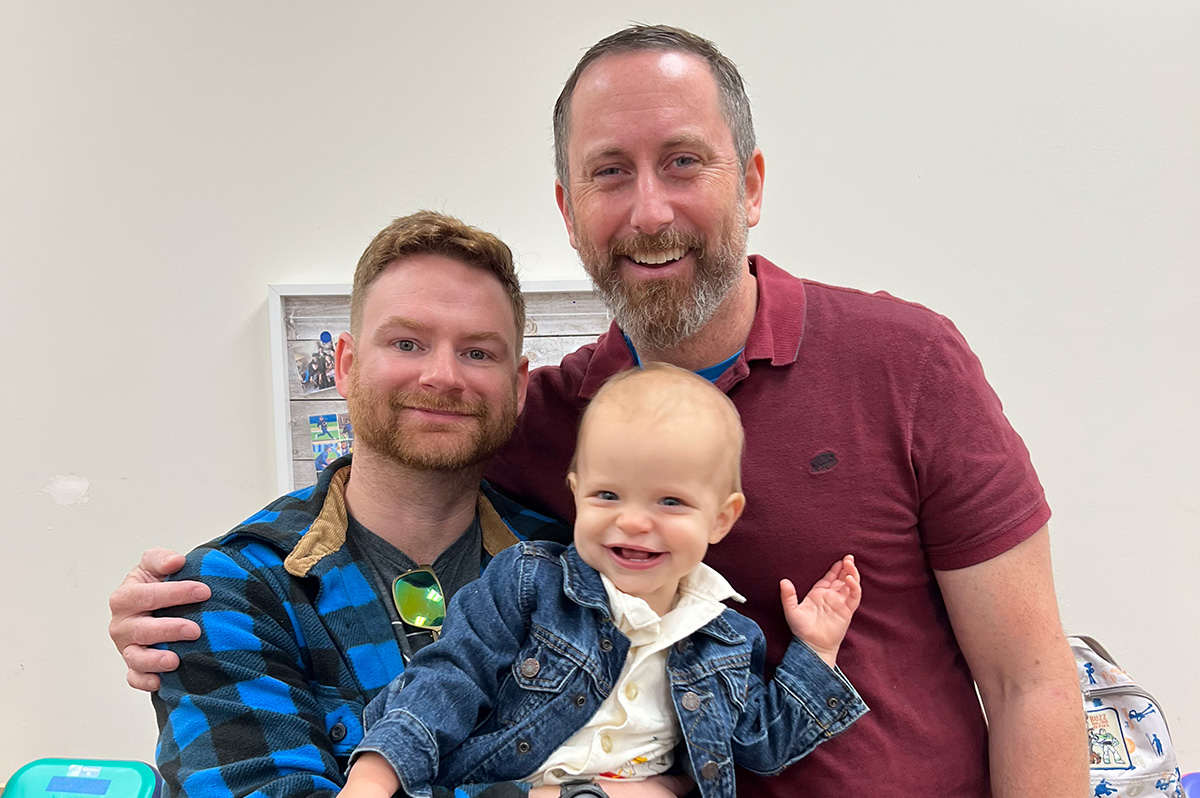
A U.S. District Court judge on Jan. 21 denied a request by attorneys representing the D.C. Metropolitan Police Department to dismiss a lawsuit filed by a gay captain accusing police officials of illegally demoting him for taking parental leave to join his husband in caring for their newborn son.
The lawsuit filed by Capt. Paul Hrebenak charges that police officials violated the U.S. Family and Medical Leave Act, a similar D.C. family leave law, and the Constitution’s Equal Protection Clause by refusing to allow him to return to his position as director of the department’s School Safety Division upon his return from parental leave.
It says police officials transferred Hrebenak to another police division against his wishes, which was a far less desirable job and was the equivalent of a demotion, even though it had the same pay grade as his earlier job.
In response to a motion filed by attorneys with the Office of the D.C. Attorney General, which represents and defends D.C. government agencies against lawsuits, Judge Randolph D. Moss agreed to dismiss seven of the lawsuit’s 14 counts or claims but left in place six counts.
Scott Lempert, the attorney representing Hrebenak, said he and Hrebenak agreed to drop one of the 14 counts prior to the Jan. 21 court hearing.
“He did not dismiss the essential claims in this case,” Lempert told the Washington Blade. “So, we won is the short answer. We defeated the motion to dismiss the case.”
Gabriel Shoglow, a spokesperson for the Office of the D.C. Attorney General, said the office has a policy of not commenting on pending litigation and it would not comment on the judge’s ruling upholding six of the lawsuit’s initial 14 counts.
In issuing his ruling from the bench, Moss gave Lempert the option of filing an amended complaint by March 6 to seek the reinstatement of the counts he dismissed. He gave attorneys for the D.C. attorney general’s office a deadline of March 20 to file a response to an amended complaint.
Lempert told the Blade he and Hrebenak have yet to decide whether to file an amended complaint or whether to ask the judge to move the case ahead to a jury trial, which they initially requested.
In its 26-page motion calling for dismissal of the case, filed on May 30, 2025, D.C. Office of the Attorney General attorneys argue that the police department has legal authority to transfer its officers, including captains, to a different job. It says that Hrebenak’s transfer to a position of watch commander at the department’s First District was fully equivalent in status to his job as director of the School Safety Division.
“The Watch Commander position is not alleged to have changed plaintiff’s rank of captain or his benefits or pay, and thus plaintiff has not plausibly alleged that he was put in a non-equivalent position,” the motion to dismiss states.
“Thus, his reassignment is not a demotion,” it says. “And the fact that his shift changed does not mean that the position is not equivalent to his prior position. The law does not require that every single aspect of the positions be the same.”
Hrebenak’s lawsuit states that “straight” police officers have routinely taken similar family and parental leave to care for a newborn child and have not been transferred to a different job. According to the lawsuit, the School Safety Division assignment allowed him to work a day shift, a needed shift for his recognized disability of Crohn’s Disease, which the lawsuit says is exacerbated by working late hours at night.
The lawsuit points out that Hrebenak disclosed he had Crohn’s Disease at the time he applied for his police job, and it was determined he could carry out his duties as an officer despite this ailment, which was listed as a disability.
Among other things, the lawsuit notes that Hrebenak had a designated reserved parking space for his earlier job and lost the parking space for the job to which he was transferred.
“Plaintiff’s removal as director at MPD’s School Safety Division was a targeted, premeditated punishment for his taking statutorily protected leave as a gay man,” the lawsuit states. “There was no operational need by MPD to remove plaintiff as director of MPD’s School Safety Division, a position in which plaintiff very successfully served for years,” it says.
In another action to strengthen Hrebenak’s opposition to the city’s motion to dismiss the case, Lempert filed with the court on Jan. 15 a “Notice of Supplemental Authority” that included two controversial reports that Lempert said showed that former D.C. Police Chief Pamela Smith put in place a policy of involuntary police transfers “to effectively demote and end careers of personnel who had displeased Chief Smith and or others in MPD leadership.”
One of the reports was prepared by the Republican members of the House Oversight and Government Reform Committee and the other was prepared by the office of Jeanine Pirro, the U.S. attorney for D.C. appointed by President Donald Trump.
Both reports allege that Smith, who resigned from her position as chief effective Dec. 31, pressured police officials to change crime reporting data to make it appear that the number of violent crimes was significantly lower than it actually was by threatening to transfer them to undesirable positions in the department. Smith has denied those claims.
“These findings support plaintiff’s arguments that it was the policy or custom of MPD to inflect involuntary transfers on MPD personnel as retaliation for doing or saying something in which leadership disapproved,” Lempert says in his court filing submitting the two reports.
“As shown, many officers suffered under this pervasive custom, including Capt. Hrebenak,” he stated. “Accordingly, by definition, transferred positions were not equivalent to officers’ previous positions,” he added.
District of Columbia
Faith programming remains key part of Creating Change Conference
‘Faith work is not an easy pill to swallow in LGBTQ spaces’
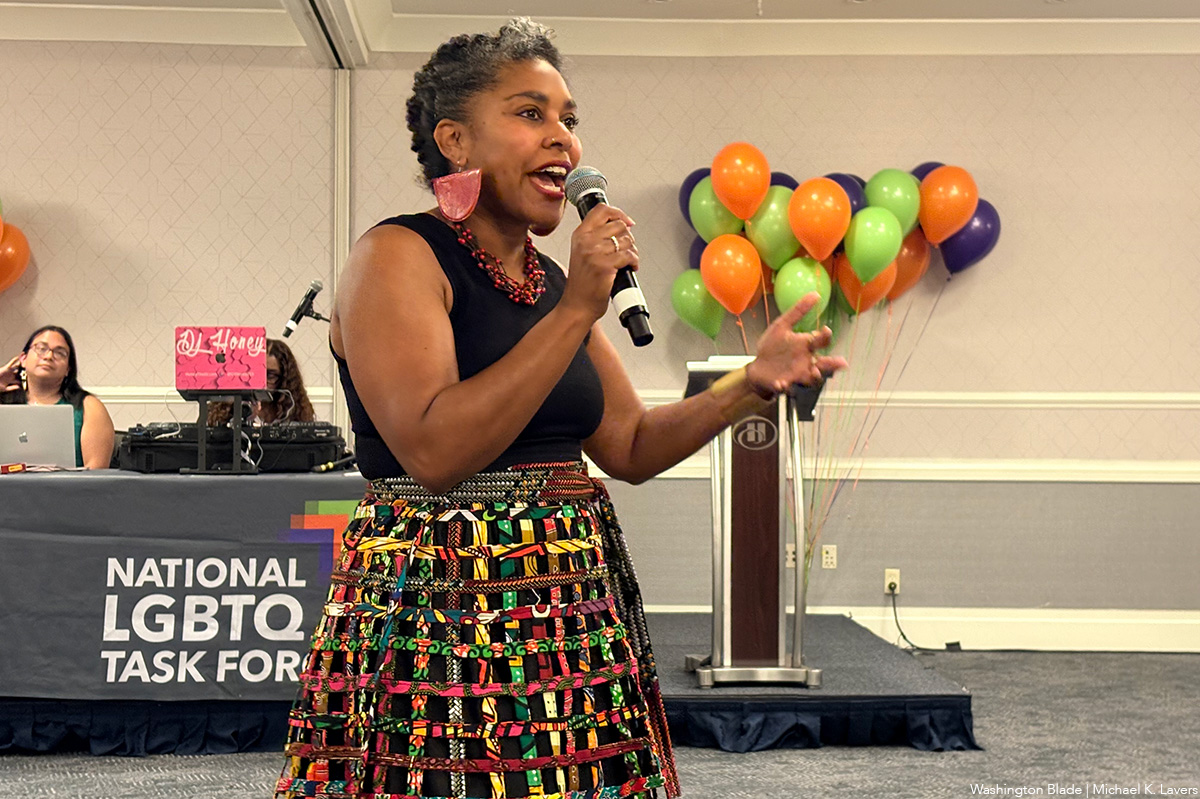
The National LGBTQ Task Force kicked off the 38th annual Creating Change conference in D.C. this week. This year, as with years past, faith and interfaith programming remains a key part of the conference’s mission and practice.
For some, the presence of faith work at an LGBTQ+ conference may seem antithetical, and Creating Change does not deny the history of harm caused by religious institutions. “We have to be clear that faith work is not an easy pill to swallow in LGBTQ spaces, and they’re no qualms about saying that we acknowledge the pain, trauma, and violence that’s been purported in the name of religion,” Tahil Sharma, Faith Work Director for the National LGBTQ Task Force, said.
In fact, several panels at the conference openly discuss acknowledging, healing from, and resisting religious harm as well as religious nationalism, including one scheduled today titled “Defending Democracy Through Religious Activism: A panel of experts on effective strategies for faith and multi-faith organizing” that features local queer faith activists like Ebony C. Peace, Rob Keithan, and Eric Eldritch who are also involved in the annual DC Pride Interfaith Service.
Another session will hold space for survivors of religious violence, creating “a drop-in space for loving on each other in healing ways, held by Rev. Alba Onofrio and Teo Drake.”
But Sharma and others who organized the Creating Change Conference explained that “a state of antipathy” towards religious communities, especially those that align with queer liberation and solidarity, is counterproductive and denies the rich history of queer religious activism. “It’s time for us to make a call for an approach to LGBTQ+ liberation that uses interfaith literacy as a tool rather than as a weapon against us,” Sharma explained.
Recognizing a local queer faith icon
Along with the panels, fighting religious nationalism and fostering communion with aligned faith activists and communities is at heart of this year’s faith work. As Sharma shared, “the person that we’re honoring this year for the faith award is Rev. Dr. Sofía Betancourt, and Dr. Betancourt is an amazing leader and someone who really stands out in representing UUs but also representing herself unapologetically.”
Based in the Washington, D.C. area, Dr. Betancourt has more than 20 years of experience working as a public minister, seminary professor, scholar, and environment ethicist, and public theologian. Her activism is rooted in her lived identities as a queer, multiracial, AfroLatine first-generation daughter of immigrants from Chile and Panama, and has been a critical voice in advancing the United Universalism towards anti-racist and pluralistic faith work.
Creating a faith-based gathering space
Sharma also said that faith fosters a unique space and practice to encounter grief and joy. For this reason, Sharma wants to “create a space for folks to engage in curiosity, to engage in spiritual fulfillment and grounding but also I think with the times that we’re in to lean into some space to mourn, some space to find hope.” The Many Paths Gathering Space serves this purpose, where visitors can stop for spiritual practice, speak with a Spiritual Care Team member, or just take a sensory break from the bustle of the conference.
This also means uplifting and foregrounding queer religious ephemera with an ofrenda to honor those who have passed, a display of nonbinary Korean American photographer Salgu Wissmath’s exhibition Divine Identity, and the Shower of Stoles, a collection of about 1,500 liturgical stoles and other sacred regalia representing the lives of lesbian, gay, bisexual, and transgender people of faith.
The Shower of Stoles
The collection was first started in 1995 by Martha Juillerat and Tammy Lindahl who received eighty stoles that accompanied them and lent them solace as they set aside their ordinations from the Presbyterian Church. The whole collection was first displayed at the 1996 General Assembly of the Presbyterian Church in New Mexico. The stoles, according to the Task Force, “quickly became a powerful symbol of the huge loss to the church of gifted leadership.”
Each stole represents the story of a queer person who is active in the life and leadership of their faith community, often sent in by the people themselves but sometimes by a loved one in their honor. About one third of all the stoles are donated anonymously, and over three-quarters of the stoles donated by clergy and full-time church professionals are contributed anonymously.
The collection shows “not just the deep harm that has been caused that does not allow people to meet their vocation when they’re faith leaders, but it also speaks to how there have been queer and trans people in our [faith] communities since the beginning of our traditions, and they continue to serve in forms of leadership,” Sharma explained.
Explicit interfaith work
Along with creating a sacred space for attendees, hosting workshops focused on faith-based action, and recognizing DC’s rich queer religious history, Creating Change is also hosting explicitly faith services, like a Buddhist Meditation, Catholic Mass, Shabbat service, Jummah Prayer Service, and an ecumenical Christian service on Sunday. Creating Change is also welcoming events at the heart of queer religious affirmation, including a Name/Gender/Pronoun/Identity Blessing Ritual and a reading and discussion around queer bibles stories with Rev. Sex (aka Rev. Alba Onofrio).
But along with specific faith-based programs, Sharma explained, “we’re looking to build on something that I helped to introduce, which was the separation of the interfaith ceremony that’s happening this year which is a vigil versus the ecumenical Christian service which is now the only thing that takes place on Sunday morning.”
This includes an Interfaith Empowerment Service this evening and an Interfaith Institute tomorrow, along with “Sing In the Revolution,” an event where folks are invited “to actually engage in the joy and rhythm of resolution and what that looks like,” Sharma said. One of the key activators behind this work is Rev. Eric Eldritch, an ordained Pagan clergy person with Circle Sanctuary and a member of the Pride Interfaith Service planning committee.
Affirming that queer faith work is part of liberation
The goal for this year, Sharma noted, alongside holding space and discussions about faith-based practice and liberation and intentional interfaith work–is to move from thinking about why faith matters in queer liberation spaces to “how is interfaith work the tool for how we’re engaging in our understanding of de-escalation work, digital strategies, navigating a deeper visioning that we need for a better world that requires us to think that we’re not alone in the struggle for mutual abundance and liberation,” Sharma explained.
It may surprise people to learn that faith work has intentionally been part of the National LGBTQ+ Task Force since its beginning in the 1980s. “We can really credit that to some of the former leadership like Urvashi Vaid who actually had a sense of understanding of what role faith plays in the work of liberation and justice,” Sharma said.
“For being someone who wasn’t necessarily religious, she certainly did have a clear understanding of the relationship between those folks who are allies, those folks who stand against us, and then those folks who sit in between–those folks who profess to be of religious and spiritual background and also are unapologetically LGBTQ+,” he continued.
This year’s faith programming builds on this rich history, thinking about “a way to kind of open doors, to not just invite people in but our people to go out into the general scene of the conference” to share how faith-based work is a tool, rather than a hindrance, to queer liberation work.
District of Columbia
Sold-out crowd turns out for 10th annual Caps Pride night
Gay Men’s Chorus soloist sings National Anthem, draws cheers
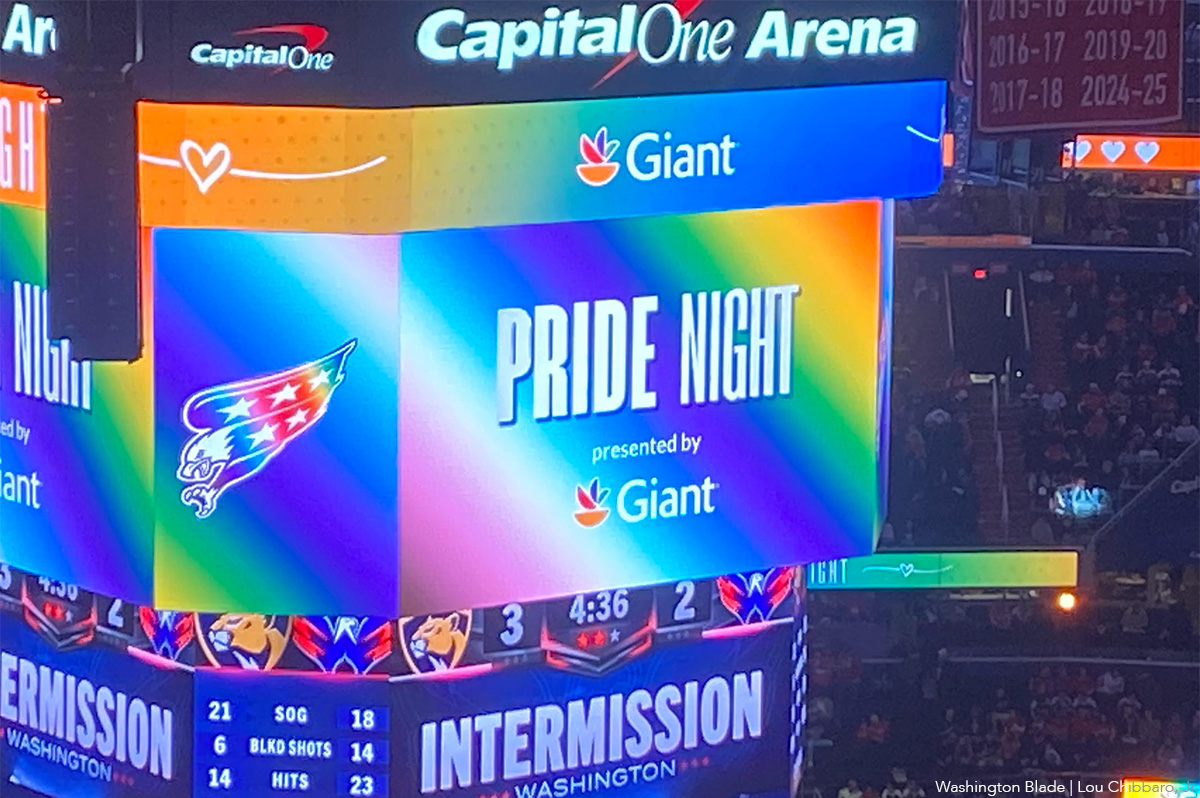
A sold-out crowd of 18,347 turned out on Jan. 17 for the 10th annual Pride Night at the Washington Capitals hockey game held at D.C.’s Capital One Arena.
Although LGBTQ Capitals fans were disappointed that the Capitals lost the game to the visiting Florida Panthers, they were treated to a night of celebration with Pride-related videos showing supportive Capitals players and fans projected on the arena’s giant video screen throughout the game.
The game began when Dana Nearing, a member of the Gay Men’s Chorus of Washington, sang the National Anthem, drawing applause from all attendees.
The event also served as a fundraiser for the LGBTQ groups Wanda Alston Foundation, which provides housing services to homeless LGBTQ youth, and You Can Play, a nonprofit organization dedicated to advancing LGBTQ inclusion in sports.
“Amid the queer community’s growing love affair with hockey, I’m incredibly honored and proud to see our hometown Capitals continue to celebrate queer joy in such a visible and meaningful way,” said Alston Foundation Executive Director Cesar Toledo.
Capitals spokesperson Nick Grossman said a fundraising raffle held during the game raised $14,760 for You Can Play. He said a fundraising auction for the Alston Foundation organized by the Capitals and its related Monumental Sports and Entertainment Foundation would continue until Thursday, Jan. 22
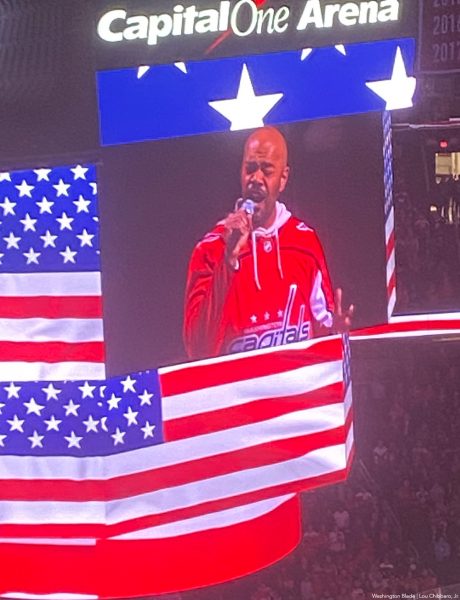
A statement on the Capitals website says among the items being sold in the auction were autographed Capitals player hockey sticks with rainbow-colored Pride tape wrapped around them, which Capitals players used in their pre-game practice on the ice.
Although several hundred people turned out for a pre-game Pride “block party” at the District E restaurant and bar located next to the Capital One Arena, it couldn’t immediately be determined how many Pride night special tickets for the game were sold.
“While we don’t disclose specific figures related to special ticket offers, we were proud to host our 10th Pride night and celebrate the LGBTQ+ community,” Capitals spokesperson Grossman told the Washington Blade.




